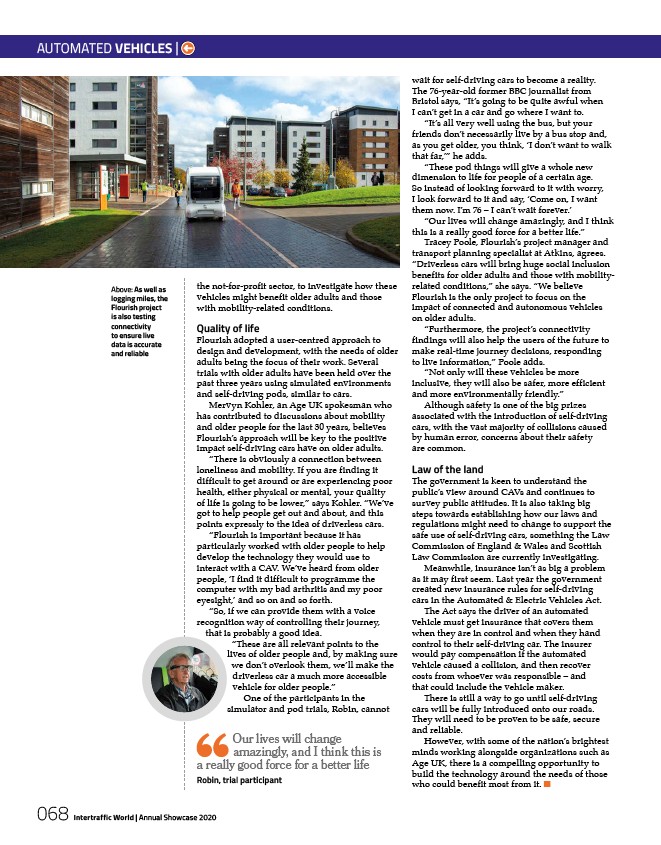
AUTOMATED VEHICLES |
the not-for-profit sector, to investigate how these
vehicles might benefit older adults and those
with mobility-related conditions.
Quality of life
Flourish adopted a user-centred approach to
design and development, with the needs of older
adults being the focus of their work. Several
trials with older adults have been held over the
past three years using simulated environments
and self-driving pods, similar to cars.
Mervyn Kohler, an Age UK spokesman who
has contributed to discussions about mobility
and older people for the last 30 years, believes
Flourish’s approach will be key to the positive
impact self-driving cars have on older adults.
“There is obviously a connection between
loneliness and mobility. If you are finding it
difficult to get around or are experiencing poor
health, either physical or mental, your quality
of life is going to be lower,” says Kohler. “We’ve
got to help people get out and about, and this
points expressly to the idea of driverless cars.
“Flourish is important because it has
particularly worked with older people to help
develop the technology they would use to
interact with a CAV. We’ve heard from older
people, ‘I find it difficult to programme the
computer with my bad arthritis and my poor
eyesight,’ and so on and so forth.
“So, if we can provide them with a voice
recognition way of controlling their journey,
that is probably a good idea.
068 Intertraffic World | Annual Showcase 2020
“These are all relevant points to the
lives of older people and, by making sure
we don’t overlook them, we’ll make the
driverless car a much more accessible
vehicle for older people.”
One of the participants in the
simulator and pod trials, Robin, cannot
wait for self-driving cars to become a reality.
The 76-year-old former BBC journalist from
Bristol says, “It’s going to be quite awful when
I can’t get in a car and go where I want to.
“It’s all very well using the bus, but your
friends don’t necessarily live by a bus stop and,
as you get older, you think, ‘I don’t want to walk
that far,’” he adds.
“These pod things will give a whole new
dimension to life for people of a certain age.
So instead of looking forward to it with worry,
I look forward to it and say, ‘Come on, I want
them now. I’m 76 – I can’t wait forever.’
“Our lives will change amazingly, and I think
this is a really good force for a better life.”
Tracey Poole, Flourish’s project manager and
transport planning specialist at Atkins, agrees.
“Driverless cars will bring huge social inclusion
benefits for older adults and those with mobilityrelated
conditions,” she says. “We believe
Flourish is the only project to focus on the
impact of connected and autonomous vehicles
on older adults.
“Furthermore, the project’s connectivity
findings will also help the users of the future to
make real-time journey decisions, responding
to live information,” Poole adds.
“Not only will these vehicles be more
inclusive, they will also be safer, more efficient
and more environmentally friendly.”
Although safety is one of the big prizes
associated with the introduction of self-driving
cars, with the vast majority of collisions caused
by human error, concerns about their safety
are common.
Law of the land
The government is keen to understand the
public’s view around CAVs and continues to
survey public attitudes. It is also taking big
steps towards establishing how our laws and
regulations might need to change to support the
safe use of self-driving cars, something the Law
Commission of England & Wales and Scottish
Law Commission are currently investigating.
Meanwhile, insurance isn’t as big a problem
as it may first seem. Last year the government
created new insurance rules for self-driving
cars in the Automated & Electric Vehicles Act.
The Act says the driver of an automated
vehicle must get insurance that covers them
when they are in control and when they hand
control to their self-driving car. The insurer
would pay compensation if the automated
vehicle caused a collision, and then recover
costs from whoever was responsible – and
that could include the vehicle maker.
There is still a way to go until self-driving
cars will be fully introduced onto our roads.
They will need to be proven to be safe, secure
and reliable.
However, with some of the nation’s brightest
minds working alongside organizations such as
Age UK, there is a compelling opportunity to
build the technology around the needs of those
who could benefit most from it. n
Above: As well as
logging miles, the
Flourish project
is also testing
connectivity
to ensure live
data is accurate
and reliable
Our lives will change
amazingly, and I think this is
a really good force for a better life
Robin, trial participant